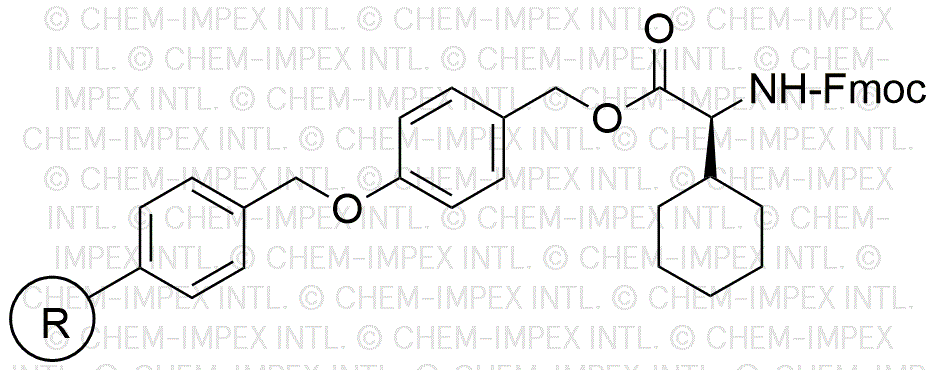Fmoc-3-cyclohexyl glycine 4-alkoxybenzyl alcohol resin is widely utilized in research focused on:
- Peptide Synthesis: This resin is essential for solid-phase peptide synthesis, allowing chemists to efficiently create peptides with specific sequences for research and therapeutic applications.
- Drug Development: It serves as a critical component in the development of new pharmaceuticals, particularly in designing peptide-based drugs that can target specific biological pathways.
- Bioconjugation: The resin is used in bioconjugation processes, facilitating the attachment of biomolecules to surfaces or other molecules, which is vital in creating targeted drug delivery systems.
- Analytical Chemistry: Researchers utilize this resin for the preparation of samples in analytical techniques, enhancing the accuracy and reliability of results in various chemical analyses.
- Material Science: It finds applications in the development of novel materials, particularly in creating functionalized surfaces that can interact with biological systems, which is beneficial for biosensors and biointerfaces.
General Information
Properties
Safety and Regulations
Applications
Fmoc-3-cyclohexyl glycine 4-alkoxybenzyl alcohol resin is widely utilized in research focused on:
- Peptide Synthesis: This resin is essential for solid-phase peptide synthesis, allowing chemists to efficiently create peptides with specific sequences for research and therapeutic applications.
- Drug Development: It serves as a critical component in the development of new pharmaceuticals, particularly in designing peptide-based drugs that can target specific biological pathways.
- Bioconjugation: The resin is used in bioconjugation processes, facilitating the attachment of biomolecules to surfaces or other molecules, which is vital in creating targeted drug delivery systems.
- Analytical Chemistry: Researchers utilize this resin for the preparation of samples in analytical techniques, enhancing the accuracy and reliability of results in various chemical analyses.
- Material Science: It finds applications in the development of novel materials, particularly in creating functionalized surfaces that can interact with biological systems, which is beneficial for biosensors and biointerfaces.
Documents
Safety Data Sheets (SDS)
The SDS provides comprehensive safety information on handling, storage, and disposal of the product.
Product Specification (PS)
The PS provides a comprehensive breakdown of the product’s properties, including chemical composition, physical state, purity, and storage requirements. It also details acceptable quality ranges and the product's intended applications.
Certificates of Analysis (COA)
Search for Certificates of Analysis (COA) by entering the products Lot Number. Lot and Batch Numbers can be found on a product’s label following the words ‘Lot’ or ‘Batch’.
Número de catálogo
Número de lote/lote
Certificates Of Origin (COO)
This COO confirms the country where the product was manufactured, and also details the materials and components used in it and whether it is derived from natural, synthetic, or other specific sources. This certificate may be required for customs, trade, and regulatory compliance.
Número de catálogo
Número de lote/lote
Safety Data Sheets (SDS)
The SDS provides comprehensive safety information on handling, storage, and disposal of the product.
DownloadProduct Specification (PS)
The PS provides a comprehensive breakdown of the product’s properties, including chemical composition, physical state, purity, and storage requirements. It also details acceptable quality ranges and the product's intended applications.
DownloadCertificates of Analysis (COA)
Search for Certificates of Analysis (COA) by entering the products Lot Number. Lot and Batch Numbers can be found on a product’s label following the words ‘Lot’ or ‘Batch’.
Número de catálogo
Número de lote/lote
Certificates Of Origin (COO)
This COO confirms the country where the product was manufactured, and also details the materials and components used in it and whether it is derived from natural, synthetic, or other specific sources. This certificate may be required for customs, trade, and regulatory compliance.

